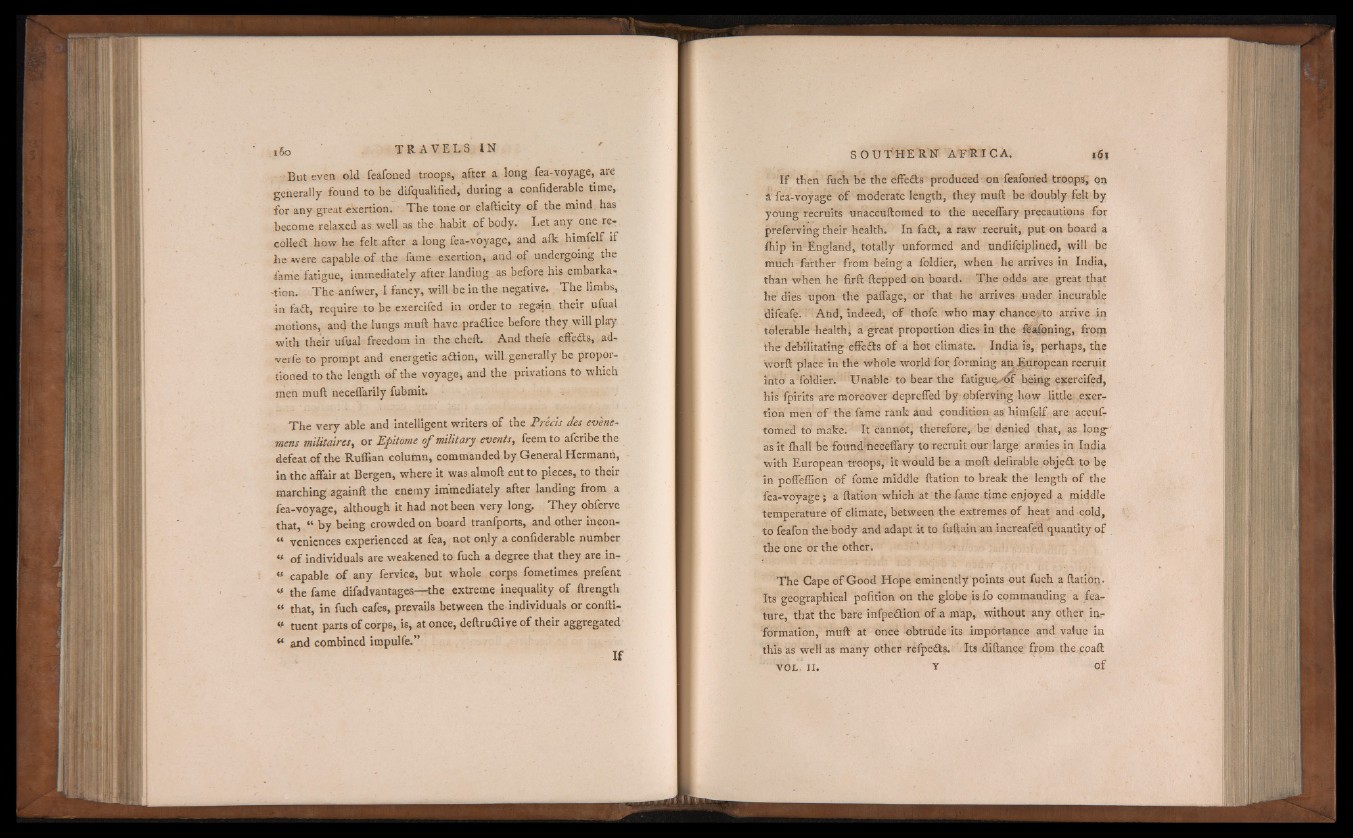
But even old feafoned troops, after a long fea-voyage, are
generally found to be difqualified, during a confiderable time,
for any great exertion.' The tone or elafticity of the mind has
become relaxed as well as the habit of body. Let any one recoiled
how he felt After a long fea-voyage, and aik himfelf if
he were capable of the fame exertion, and of undergoing the
fame fatigue, immediately after landing as before his embarka-
-tion. The anfwer, I fancy, will be in the negative. The limbs,
in fad, require to be exercifed in order to regain, their ufual
-motions, and the lungs muft have pradice before they will plary
with their ufual freedom in the eheft. And thefe effeds, ad-
verfe to prompt and energetic adion, will generally be proportioned
to the length of the voyage, and the privations to which
men muft neceffarily fubmit.
The very able and intelligent writers of the Precis des event-
mens militaircs, or Epitome of tnilitoTy events, feem to aicribe the
defeat of the Ruffian column, commanded by General Hermann,
in the affair at Bergen, where it was almoft cut to pieces, to their
marching againft the enemy immediately after landing from a
fea-voyage, although it had not been very long. They obferve
that, “ by being crowded on board tranfports, and other incon-
“ veniences experienced at fea, not only a confiderable number
u of individuals are weakened to fuch a degree that they are in-
“ capable of any fervice, but whole corps fometimes prefent
« the fame difadvantages— the extreme inequality of ftrength
« that, in fuch cafes, prevails between the individuals or confti-
•* tuent parts of corps, is, at once, deftrudive of their aggregated
« and combined impulfe.”
If
If then fuch be the effeds produced on feafoned troops; on
a fea-voyage of moderate length, they muft be doubly felt by
young recruits unaccuftomed to the neceffary precautions for
preferving their health. In fad, a raw recruit, put on board a
ihip in England, totally unformed and undifciplined, will be
much farther from being a foldier, when he arrives in India,
than when he firft ftepped on board. The odds are great that
he dies upon, the paffage, or that he arrives under incurable
difeafe. And, indeed', of thofe who may chancejito arrive in
tolerable health* a great proportion dies in the feafoning, from
the debilitating effeds of a hot climate. India is, perhaps, the
worft place in the whole world for, forming an European recruit
into a foldier. Unable to bear the fatiguqypf being exercifed,
his fpirits -are moreover depreffed by obferving how little, exertion
men of the fame rank and condition as himfelf are accuf-
tomed to make. It cannot, therefore, be denied that, as long-'
as it ihall be found'heceffary to recruit our large armies in India
with European troops, it would be a moft defirable objed to be
in poffeffion of fome middle ftation to break the length of the
fea-voyage; a ftation which at the fame time enjoyed a middle
temperature of climate, between the extremes of heat and cold,
to feafon the body and adapt it to fuftain an increafed quantity of
the one or the other.
The Cape of Good Hope eminently points out fuch a ftation.
Its geographical pofition on the globe is fo commanding a feature,
that the bare infpedion of a map, without any other information,
muft at once obtrude its importance and value in
this as well as many other refpeds. Its diftance from the coaft
von, ii . y of